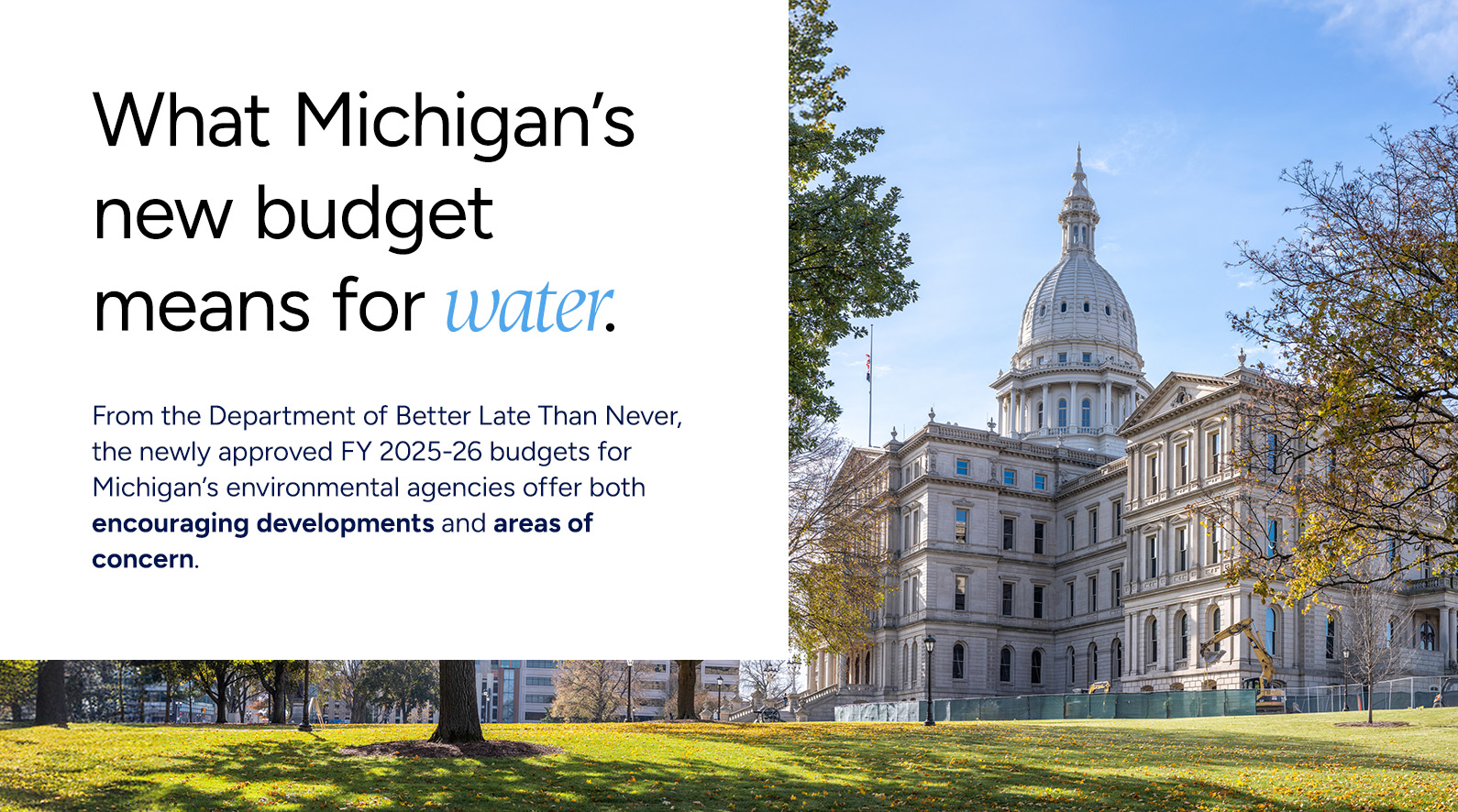
Flow’s mission is to ensure Michigan’s waters are healthy, public, and protected for everyone. Our priorities include water infrastructure funding, tackling nitrate contamination in drinking water, factory farm pollution, and the need for a statewide septic code. We track state budgets closely because they signal real-world priorities.
The newly approved FY 2025-26 budgets for Michigan’s environmental agencies offer both encouraging developments and areas of concern.
Signs of progress.
Several bright spots align with Flow’s goals.
The budget maintains investments in drinking water infrastructure. Lead service line replacement efforts received a net increase of $13.4 million, and another $34 million is set aside for local water projects through the State Revolving Fund. While much of this funding is one-time rather than permanent, it represents real dollars for pipes, treatment upgrades, and safer drinking water in the near future.
There is also forward progress on transparency. New reporting requirements will make the Michigan Department of Environment, Great Lakes, and Energy (EGLE) more accountable for how quickly it issues permits and how well it meets performance targets. These kinds of changes don’t grab headlines, but they matter, especially when communities struggle to understand or navigate the regulatory process.
One especially helpful provision is a new investment in permitting guidebooks for industries like large livestock operations. For groups like Flow working to halt pollution from Concentrated Animal Feeding Operations (CAFOs), clearer rules mean fewer loopholes and stronger protections for lakes, streams, groundwater, and rural communities.
Areas Michigan must not ignore.
Still, there are warning signs worth watching.
The State Revolving Fund—the backbone of Michigan’s water infrastructure financing system—lost $34 million in ongoing annual support, which was replaced with one-time funding. In other words, the funding exists for now, but it’s no longer guaranteed in future years. That kind of uncertainty makes it harder for small towns and rural communities to plan long-term water projects.
An even more glaring omission is the decision not to fund a statewide septic system database. Michigan remains the only state in the country without a uniform septic code, and failing septic systems are a major source of groundwater and drinking water contamination—especially in areas already facing nitrate pollution. Knowing where systems are, and whether they’re failing, is the first step toward fixing them. That step is now delayed.
Another area of grave concern is reduced staffing. Across EGLE, the DNR, and the Michigan Department of Agriculture & Rural Development (MDARD), the FY 2025-26 budget reflects a net loss of 49 full-time positions compared to the previous year. EGLE alone loses 15 positions, including staff responsible for water quality programs, contaminated site remediation, and municipal water assistance. The DNR loses 30 positions, and MDARD loses four, including staff involved in pesticide management and laboratory monitoring.
These reductions may look like mere numbers on paper, but they translate directly to fewer boots on the ground—fewer inspectors, engineers, hydrologists, and scientists who ensure that permits are enforced, wells are tested, pollution is contained, and communities receive timely support. Michigan’s environmental laws are only as strong as the departments tasked with administering them. When staffing is cut, delays grow longer, backlogs increase, and the state’s ability to respond to urgent, immediate, and emerging threats—whether from PFAS, nitrates, failing septic systems, or industrial spills— diminishes.
Michigan has made meaningful investments in water infrastructure and transparency. To fully realize those gains, the state must also preserve the workforce required to carry them out.
Moving forward.
The takeaway is not that Michigan is abandoning clean water efforts—but that much of the current progress depends on temporary funding. That leaves big questions for long-term water protection.
Flow will continue to advocate for permanent, reliable infrastructure funding, stronger well and septic oversight, and protections for rural communities facing pollution burdens.
Budgets reflect priorities. This one keeps Michigan moving, but not yet fast enough toward the stable, long-term protections that our water and people deserve.





